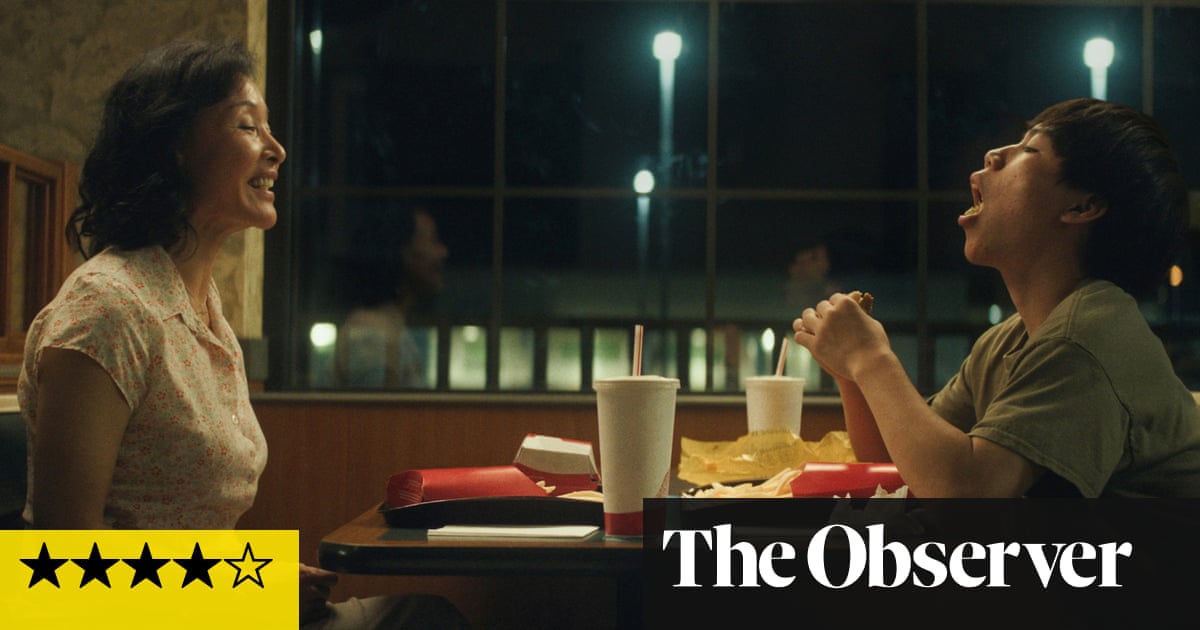It takes a certain maturity to make – and appreciate – a good coming-of-age film. Sean Wang’s debut feature is the tale of Chris Wang (Izaac Wang, no relation to the director), a Taiwanese American boy growing up in the Bay Area, California, in the late 00s – a time of AOL Instant Messenger and emo punk posturing. But it’s also about Chris’s mum, Chungsing (Joan Chen), offering a compassionate insight into the struggles of an immigrant parent that few self-involved 13-year-olds could muster.
The tender teen years have been lovingly chronicled by successive generations of first-time US film-makers, but up until fairly recently it was rare for kids such as Chris – the children of immigrants from places like India, Korea, China and Iran – to see their young lives reflected on screen with any kind of cultural specificity. Much less the woven-in, naturalistic kind that Dìdi pursues from its title onwards: “Dìdi”, the Chinese word for “little brother”, is what Chris’s family call him, an endearing, slightly infantilising nickname that he is all too eager to shake off. Whereas outside home, Chris introduces himself as Wang Wang, a juvenile and mildly insulting nickname that he doesn’t yet realise he’s ready to outgrow.
Since Chris and his “bridge generation” peers didn’t yet have Dìdi, they watch Superbad, the 2007 comedy about high school seniors, played by Jonah Hill and Michael Cera, attempting to lose their virginity. Or maybe the 1999 teen gross-out comedy American Pie, which Dìdi also gently riffs on, without featuring directly. Thankfully, Chris doesn’t pound a patriotic baked desert in an attempt to gain sexual experience, but his low-key version involves apple slices and a YouTube kissing tutorial, and is no less awkward or “American” for it.
In this way, Dìdi takes its place alongside other racially diverse entries to the coming-of-age canon such as Pixar’s feature animation Turning Red, about a 13-year-old Chinese Canadian girl who periodically transforms into a giant menstruation metaphor, and Fresh Off the Boat, ABC’s Taiwanese-American family sitcom (2015-2020) about fitting in in suburban Florida.
With its wistful yearning and sun-bleached parking lot palette, though, Dìdi owes more to Richard Linklater’s very good – and very white – 2014 opus Boyhood. And like Bo Burnham’s Eighth Grade, this film understands that, irrespective of where your parents were born, or what part of the world they raised you in, if you grew up in the late 00s, you grew up primarily online.
MySpace was the secret diary where thoughts were recorded and favourites listed; Facebook was the community dance hall where crushes were formed and flirting happened; and YouTube was the playing field where youthful energies were expended. Or, in Chris/Sean’s specific case, a film-making vocation was discovered.
This is Chris’s ploy to get in with a local skate crew: he’ll offer to be their videographer, just as the young Sean Wang did in real life after being inspired by Spike Jonze’s early work. Wang went on to attend film school at the University of Southern California, and made several short films (including the Oscar nominated doc Nǎi Nai & Wài Pó) before eventually breaking through with this Sundance award-winning debut feature at the age of 29. So, retrospectively at least, it feels like a self-deprecating in-joke when Chris’s fledgling film-making efforts turn out to be an #EpicFail – to use the terminology of the era – instead of a Spielbergian success a la The Fabelmans. The boy does not become a man, or an artist, overnight. Nor even over the course of one transformative and cinematic summer.
after newsletter promotion
But it doesn’t really matter, because while Chris is preoccupied with impressing his peers, the film uses a wider lens to view his life, bringing the relationship with his mother to the foreground. Chen’s understated performance allows us to see all the things that Chris isn’t yet able to: her sacrifice of her own creative ambitions; how patiently she puts up with her mother-in-law’s endless griping; and, most of all, how constantly she loves her son. It turns out the dismissive way Chris treats his mother is far more devastating to his cool image than any out-of-focus ollie or poorly framed flip. The parting words of a sagacious skatepark buddy could have been this film’s bittersweet tagline: “Dude, don’t talk to your mom like that.”

